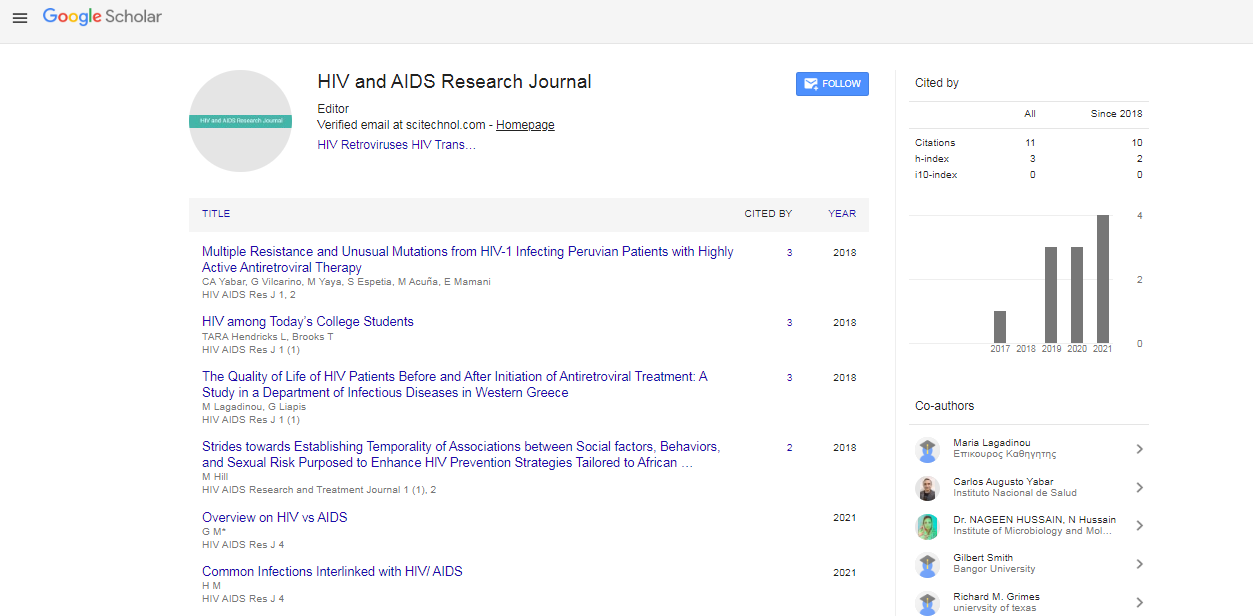Opinion Article, Hiv Aids Res J Vol: 6 Issue: 2
Enhancing the HIV Clinical Therapies: Advances and Significance
Rolf Marthon*
1Department of Pharmacology, Catholic University of Health and Allied Sciences, Mwanza, Tanzania
*Corresponding Author: Rolf marthon,
Department of Pharmacology, Catholic
University of Health and Allied Sciences, Mwanza, Tanzania
E-mail: rolf_marthoncuha32@gmail.com
Received date: 23 August, 2023, Manuscript No. HARJ-23-118052;
Editor assigned date: 25 August, 2023, PreQC No. HARJ-23-118052 (PQ);
Reviewed date: 08 September, 2023, QC No. HARJ-23-118052;
Revised date: 15 September, 2023, Manuscript No. HARJ-23-118052 (R);
Published date: 22 September, 2023, DOI: 10.4172/Harj.1000129
Citation: Marathon R (2023) Enhancing the HIV Clinical Therapies: Advances and Significance. HIV AIDS Res J 6:2.
Description
Human Immunodeficiency Virus (HIV) remains a global public health challenge, affecting millions of people worldwide. However, significant advancements in clinical therapies have transformed the landscape of HIV management. The history of HIV clinical therapies is marked by remarkable progress. Since the discovery of the virus in the 1980s, a combination of antiretroviral drugs has been the cornerstone of HIV treatment. The primary aim of these therapies is to suppress viral replication, boost immune function, and ultimately prolong and improve the quality of life for those living with HIV.
Early HIV clinical therapies, often consisting of monotherapy with a single antiretroviral drug, were associated with numerous limitations. These early drugs had lower efficacy and often led to the rapid development of drug-resistant strains of HIV. As a result, the HIV medical community has continuously strived to refine and optimise treatment strategies.
The evolution of antiretroviral therapy has seen significant strides, leading to more effective, safer, and better-tolerated treatments. Highly Active Antiretroviral Therapy (HAART) introduced in the mid-1990s, marked a transformative period in HIV clinical therapies. It involves the use of a combination of antiretroviral drugs from different classes. This strategy maximizes viral suppression, reduces the risk of drug resistance, and improves immune system recovery.
Fixed-Dose Combinations (FDCs) are medications that combine multiple antiretroviral drugs into a single pill. This innovation has simplified treatment regimens, improved adherence, and reduced the likelihood of treatment failure. Integrase inhibitors are a class of antiretroviral drugs that effectively inhibit the integration of HIV's genetic material into a host cell. They are highly potent and welltolerated, with fewer side effects compared to earlier drug classes.
Long-acting antiretroviral medications are administered through injections or implants, reducing the need for daily pill regimens. This approach has the potential to enhance adherence and maintain viral suppression. The advances in HIV clinical therapies have profound implications for the health and well-being of those living with HIV, as well as for public health. Advanced therapies enable individuals living with HIV to maintain better health, reduce the risk of opportunistic infections, and lead productive lives. They enhance the overall quality of life for those affected by the virus.
Effective antiretroviral therapy has extended the lifespan of individuals with HIV, effectively transforming HIV into a chronic, manageable condition rather than a terminal illness. Antiretroviral therapy not only benefits the individual but also plays an essential role in preventing the transmission of the virus to in intimacy.
By normalising HIV treatment and effectively controlling the virus, advanced therapies contribute to reducing the stigma associated with HIV. This encourages more people to seek testing and treatment. By reducing the burden on healthcare systems through fewer hospitalisations and opportunistic infections, advanced clinical therapies provide economic advantages for both individuals.
Conclusion
The advances in HIV clinical therapies have transformed the landscape of HIV management, providing hope, improved health, and longevity for those living with the virus. These therapies not only enhance the quality of life for individuals but also play a vital role in preventing the transmission of HIV to others. As studies and technology continue to progress, the ongoing challenge is to ensure that advanced therapies are accessible to all, that adherence is supported, and that one can remain vigilant in the fight against HIV. The significance of these therapies in the global response to the HIV epidemic cannot be overstated, bringing us closer to the goal of a world without AIDS.
 Spanish
Spanish  Chinese
Chinese  Russian
Russian  German
German  French
French  Japanese
Japanese  Portuguese
Portuguese  Hindi
Hindi 